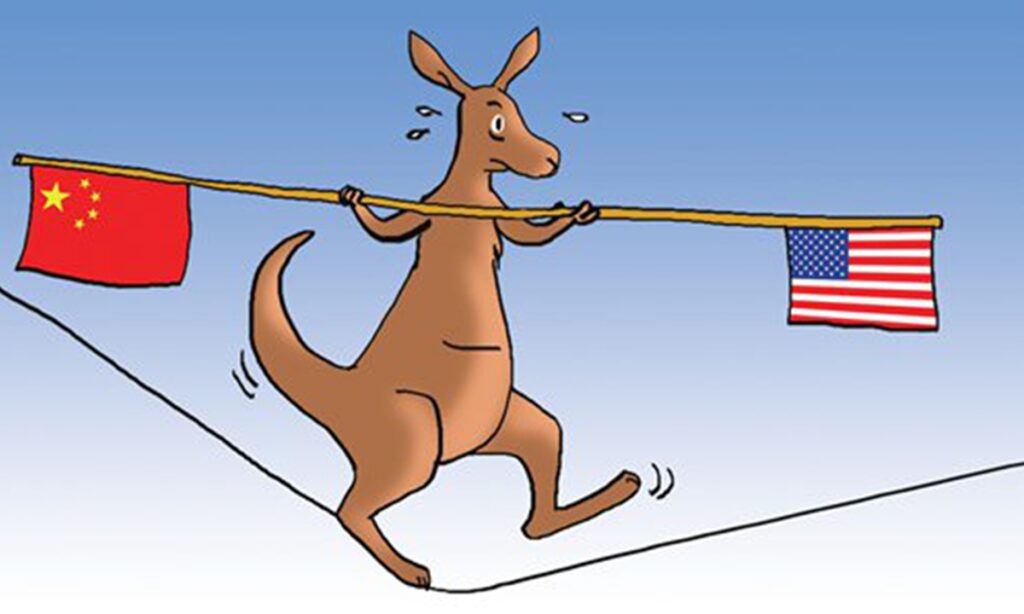Australian Prime Minister Scott Morrison declared on Monday that his country does not want to be forced into a “binary choice” between the US and China.
But hasn’t Australia already picked a side? And it, obviously, was not “forced” by China. If Canberra wishes to reverse China-Australia ties with nothing more than lip service, it would be ridiculous and naive.
Morrison said, “Our actions are wrongly seen and interpreted by some only through the lens of the strategic competition between China and the US… as if Australia does not have its own unique interests or views as an independent sovereign state.”
If this is truth, how should people digest Australia’s interfering behavior, which follows the US’ footsteps, in issues such as Hong Kong and Xinjiang, meddling in the national security legislation of Hong Kong, and endorsing the island of Taiwan’s attempt to force its way into the World Health Assembly? How could Canberra possibly whitewash its moves to ban Chinese companies from participating in its 5G network construction, repeatedly preventing Chinese enterprises from investing in Australia under the name of “national security” without solid proof? And why would it promote the so-called independent international inquiry into the origins of COVID-19, which was apparently aimed at smearing China?
Australia wants to prove it has not taken sides, but when Sinophobia among Australians bubbled, Canberra did not make efforts to address the issue. Worse, instead of taking practical actions to improve ties with China, Australia proactively participated in more US-led anti-China campaigns, including promoting the Quad and Malabar exercise. Right after Australia signed the Regional Comprehensive Economic Partnership agreement, it inked a breakthrough defense pact with Japan, allowing reciprocal visits for training and operations, which is widely interpreted as targeting China.
No matter how Australia attempts to justify its moves, all it has done displayed it is fulfilling missions as an US vassal state, pleasing Uncle Sam, which is filled with obsession against China.
Morrison must have felt the heat for doing so, and its survival instinct has started to kick in. Facing the badly-hit trade with China, ranging from the sales of red wine to coal, the Australian government may finally realize it can no longer cast a cold eye to the consequences of deteriorating ties with Beijing. Canberra is rewarded nothing for tying itself to the US chariot. Quite the contrary, it has suffered enough losses already.
Australia is puzzled – it is offending China while hoping Beijing can tolerate Canberra’s wanton policies toward China. The country has not yet decided on a clear strategic development goal: whether to side with the US and follow the latter’s policies, or become independent in the real sense and chart its own course. If it is serious about not making a “binary choice,” would it dare to quit either the Five Eyes or Quad?
When Morrison said “…as if Australia does not have its own unique interests,” he should ask himself, if Australia’s interests are “unique,” why has the country coordinated with the US so closely in ganging up against China and stirring up tensions in the region?
In a recent interview with Global Times, Geoff Raby, former Australian ambassador to China, said that Australia needs to recognize that its interests in the China relationship are not the same as the US’. Unfortunately, the current government has not yet woken up to it.
China has too often seen Australia doing one thing while saying another. Because of this, its trust in Canberra has collapsed. The bilateral relationship can in no way be fixed by empty slogans.
Spelling out Australia’s stance against taking sides in words is no olive branch, but proving such stance in deeds is. When Uncle Sam garners allies against Beijing and takes more actions to contain China, would Canberra respond with a loud “No”?
Global Times


